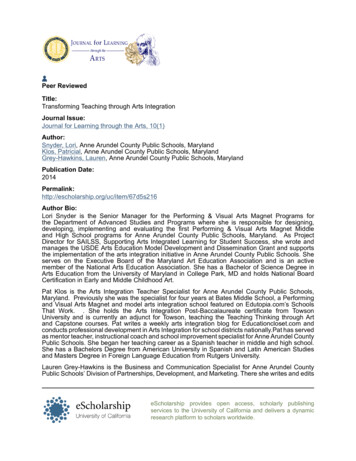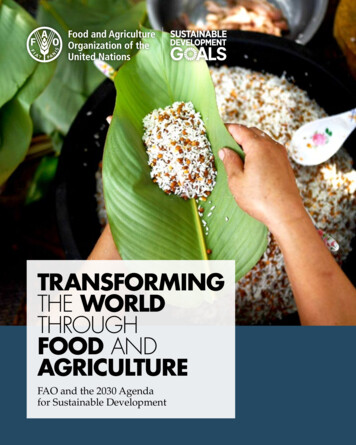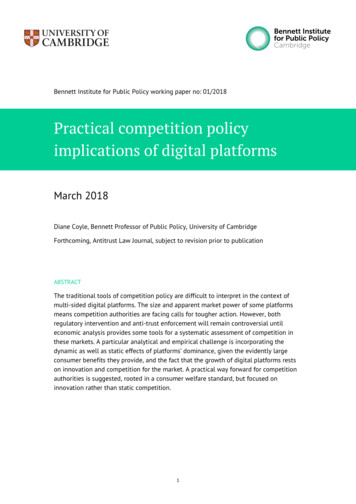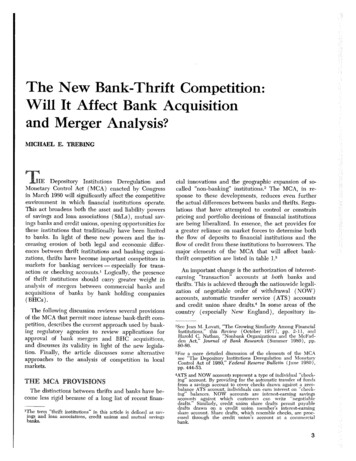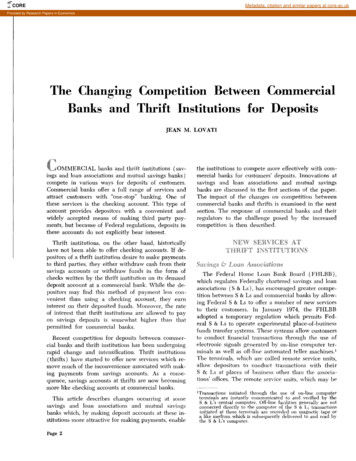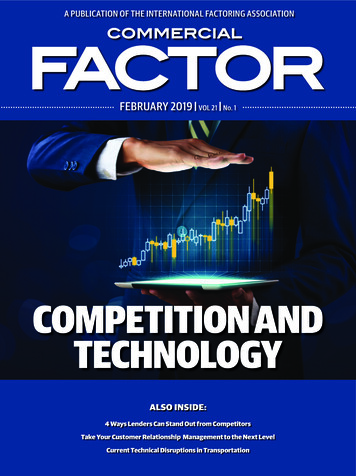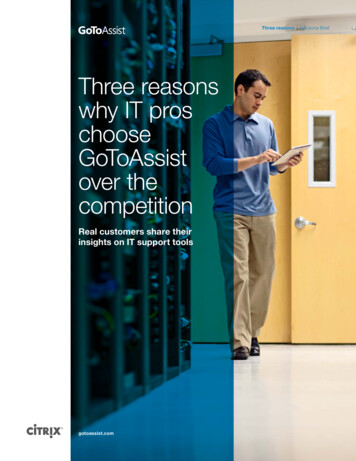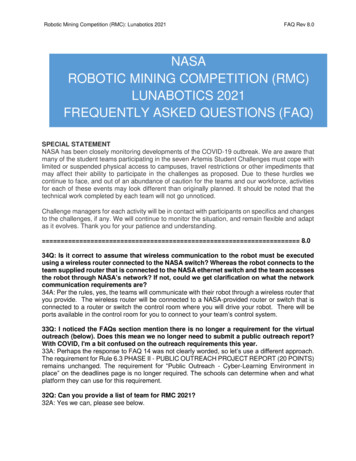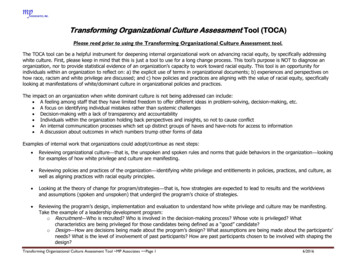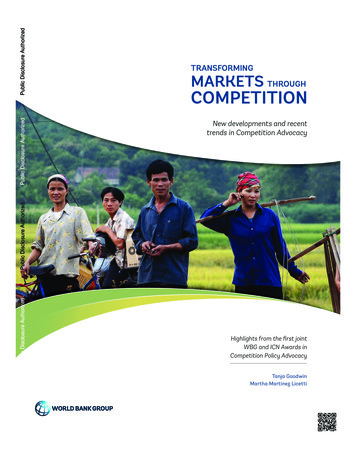
Transcription
Public Disclosure AuthorizedMarkets throughcompetitionNew developments and recenttrends in Competition AdvocacyPublic Disclosure AuthorizedPublic Disclosure AuthorizedPublic Disclosure AuthorizedTransformingHighlights from the first jointWBG and ICN Awards inCompetition Policy AdvocacyTanja GoodwinMartha Martinez LicettiCompetitionAdvocacyRep FINAL.indd 14/12/16 9:26 AM
2016 International Bank for Reconstruction and Development / The World Bank1818 H Street NWWashington DC 20433Telephone: 202-473-1000Internet: www.worldbank.orgThis work is a product of the staff of The World Bank with external contributions. The findings, interpretations, andconclusions expressed in this work do not necessarily reflect the views of The World Bank, its Board of Executive Directors,or the governments they represent.The World Bank does not guarantee the accuracy of the data provided in the country’s submissions to the AdvocacyContest. The boundaries, colors, denominations, and other information shown on any map in this work do not imply anyjudgment on the part of The World Bank concerning the legal status of any territory or the endorsement or acceptance ofsuch boundaries.Rights and PermissionsThe material in this work is subject to copyright. Because The World Bank encourages dissemination of its knowledge, thiswork may be reproduced, in whole or in part, for noncommercial purposes as long as full attribution to this work is given.Any queries on rights and licenses, including subsidiary rights, should be addressed to World Bank Publications, The WorldBank Group, 1818 H Street NW, Washington, DC 20433, USA; fax: 202-522-2625; e-mail: pubrights@worldbank.org.Cover photo: World Bank GroupDesign: Corporate Visions, Inc.CompetitionAdvocacyRep FINAL.indd 24/12/16 9:26 AM
ContentsContents3Message from the Senior Director AT THE WORLD BANK GROUP4Message from the Chair of the International Competition Network5Acknowledgments6Chapter 1: Introduction8Chapter 2: New developments and recent trends in competition advocacy18Chapter 3: The contest21Winners39Honorable Mentions48Chapter 4: Key lessons learned52BibliographyHighlights from the first joint WBG and ICN Awards in Competition Policy AdvocacyCompetitionAdvocacyRep FINAL.indd 114/12/16 9:26 AM
2CompetitionAdvocacyRep FINAL.indd 2Transforming Markets through competition4/12/16 9:26 AM
MessageMessage from theSenior Directorat The World Bank GroupThis publication showcases the results of the 2014–2015 Competition Advocacy Contest, the result of a fruitful collaboration between theWorld Bank Group’s Trade & Competitiveness Global Practice and the International Competition Network (ICN). The awardees for this,the second round of the contest, have been recognized under the theme of “inclusive growth for shared prosperity.” The winning entriessubmitted by competition authorities in countries around the world differ, but they all touch upon a unifying theme. It is that successfulexperiences in competition advocacy go beyond the mission profile or legal mandate of a single competition authority; the best results comefrom an integrated and coordinated strategy to infuse competition principles in all government interventions in the economy.The initiative got its start when the Bank Group’s Competition Policy practice launched a Global Competition Advocacy Contest to formallyrecognize countries for their efforts in conducting competition advocacy. Competition authorities play a key role in shaping market outcomesand increasing the effectiveness of broader public policies aimed at promoting robust competition in various business sectors. Competitionauthorities do more than enforce laws against anti-competitive practices. They also advocate against public and private sector actions thattolerate or even promote such practices. When government interventions facilitate cartels, favor specific firms, or allow incumbent firmsto control markets, or where professional associations assist in coordination among competitors, competition authorities can identify andadvise on the downsides of such policies and present options that strengthen competition.Advocacy initiatives lay the foundation for a pro-competition vision of Central Banks, Ministries and Sector Regulators. In Israel, afocused study on a financial services segment led the central bank and cabinet to implement more effective measures to increase sectorperformance. In Mexico, analysis of the effects on competition of draft laws and regulations gradually trained ministries and regulators toconsider effects of policies on markets. Through advocacy in Moldova, public officials now more consistently embed non-discriminationcriteria in public aids. In El Salvador, working with limited resources, the government was able to generate substantial citizen engagement incompetition policy.As past contest winners have demonstrated, successful competition advocacy delivers tangible economic benefits. Preventing anassociation of healthcare providers in Kenya from increasing charges saved consumers around 1.7 million a year. Prices for domesticflights came down by 70 percent in Indonesia following removal of restrictive air fare regulation. Twenty-two percent more Colombians usemobile internet since a 4G spectrum auction allowed for entry of additional operators. Mexican authorities were able to spend 185 millionmore on public health thanks to changes in the procurement process that improved competition conditions.This publication is intended to be useful as well as celebratory. It shares broader lessons-learned on effective advocacy tools and strategies,and discusses innovative ways of adapting to new competition challenges. Whether reacting to disruptive technologies, focusing on subnationalentities, or combining advocacy with enforcement measures, competition advocacy can be the seed to better understanding of market featuresand competition dynamics all across the government and generates momentum for a comprehensive national competition policy.The Competition Advocacy Contest has become a public good for sharing knowledge and practical experience among countries. As theBank Group continues its collaboration with the ICN, I am confident that the emerging success will positively influence public policymakingfor the benefit of consumers and businesses everywhere.Sincerely,Anabel GonzálezSenior DirectorTrade & Competitiveness Global PracticeWorld Bank GroupHighlights from the first joint WBG and ICN Awards in Competition Policy AdvocacyCompetitionAdvocacyRep FINAL.indd 334/12/16 9:26 AM
Message from the Chairof the InternationalCompetition NetworkCompetition advocacy is nowadays considered, together with enforcement, a core business of an antitrust authority and plays akey role in promoting a competitive environment, to the benefit of consumers and the economy overall.This is why competition agencies around the world devote constant efforts to build public support for competitive markets andaddress disproportionate or unnecessary public restrictions that may undermine the benefits of competition, by providing inputs togovernment and legislators on proposed or existing legislation, regulations, or policies. In many jurisdictions, competition advocacyappears to be the only way to address the challenges of their negative economic climate and foster growth.Recognizing its crucial importance, the International Competition Network (ICN) — a project-oriented, consensus-based, virtualnetwork of antitrust agencies – focused on competition advocacy since its foundation in 2001, when it was formed by officialsof 14 jurisdictions. Today, with more than 130 member jurisdictions, ICN provides for competition authorities a platform to sharetheir experiences, the advocacy tools and strategies used in various contexts, for example during an economic recession, or aliberalization process, or in the contest of emerging economies.It is no surprise that as ICN chair I was delighted by the invitation of the World Bank Group to jointly launch a CompetitionAdvocacy Contest in 2014/15 after the successful first round of the Advocacy Contest carried out by the World Bank in 2013/14.The idea of a contest to showcase successful advocacy stories was also well received within ICN as an innovative way to shareexperiences and learn from each other.The general theme of the 2014/15 Contest, “Inclusive growth for shared prosperity,” reflects the concerns of the wide membershipof these two international organizations and the winning stories proved to be so inspiring that the Advocacy Working Group of ICNdecided to present them in more detail to its members in an ICN teleseminar in November 2015. The reader will be also impressedby the stories and actions of the winning agencies reported in this publication.Building on this fruitful experience, the joint work proceeds with the organization of the 2015/16 edition of the Contest which isfocused on “How to Build a Culture of Competition for Private Sector Development and Economic Growth.” I am confident that theclose cooperation between ICN and World Bank will entail further opportunities for joint initiatives in the near future. The best is yetto come.Sincerely,Andreas MundtChairInternational Competition Network4CompetitionAdvocacyRep FINAL.indd 4Transforming Markets through competition4/12/16 9:26 AM
AcknowledgmentsAcknowledgmentsThis project was made possible through financial support fromof International Affairs (COFECE); Moldova: Luminita Arama,the Facility for Investment Climate Advisory Services (FIAS) andHead of External Relations and European Integration Unitprogrammatic support from the United Kingdom’s Department(CCRM), Viorica Carare, President (CCRM); New Zealand:for International Development (DfID).Nicky Beechey, Chief Adviser (NZCC); Portugal: CristinaThe World Bank Group’s Trade and Competitiveness GlobalPractice (T&CGP) wishes to thank the competition authoritiesof participating governments for their entries in the CompetitionPolicy Advocacy Awards Competition. Among the honoreecountries, we would particularly wish to acknowledge thecontributions of officials working in the competition policy field:El Salvador: Karla Chinchilla, Communication Director (SC),Camacho, Head of the International Relations Unit (PCA) andMaria João Melícias, Member of the Board (PCA); Russia:Anna Pozdnyakova, Consultant (FAS); Singapore: Lim WeiLu, Assistant Director (CCS) and Ng Ming Jie, Senior AssistantDirector (CCS); and South Africa: Donnavan-John Linley,Economist (CCSA) and Tembinkosi Bonakele, Commissioner,(CCSA).Cesar Azmitia, Digital Manager (SC) and Regina Vargas, HeadThis book was prepared by Tanja Goodwin (WBG) and Marthaof Competition Advocacy (SC); Finland: Teem Karttunnen,Martinez Licetti (WBG). It has benefited greatly from comments,Senior Research Officer (FCCA); Greece: Dimitris Loukas,inputs and technical discussions with Lucía Villarán (WBG)Vice-President (HCC) and Lila Katsereli, Head of Competitionand peer reviewers Álvaro Quijandría (WBG) and Tony GoochAdvocacy Unit (HCC); Iceland: Páll Gunnar, Director General(Senior Competition Expert). The suggestions of the peer(ICA) and Hilmar Thordarson, Director of Administration (ICA);reviewer Alessandra Tonazzi (AGCM) and the support by theIndonesia: Wahry Retno, Senior Investigator (KPPU); Israel:ICN Advocacy Working Group are gratefully acknowledged.Noa Zvi-Oliver, Director of International Affairs (IAA) andResearch assistance was provided by Guilherme de AguiarDana Heller, Head of Competition Division and Deputy ChiefFalco (WBG). Writing and editing support was provided by KimEconomist (IAA); Kenya: Lilian Mukoronia, Senior AdvocacyMurrell. Design and layout of the publication were undertaken byOfficer (CAK) and Maryanne Nduati, Policy & Research AnalystCorporate Visions, Inc.(CAK); Malawi: Lewis Kulisewa, Director of Consumer Welfareand Education (CFTC), Charlotte Wezi, Executive Director(CFTC); Mexico: Carolina Garayzar, Deputy Director GeneralThe preparation of the publication was carried out under theguidance of Anabel González and Jose Guilherme Reis at theWBG.Highlights from the first joint WBG and ICN Awards in Competition Policy AdvocacyCompetitionAdvocacyRep FINAL.indd 554/12/16 9:26 AM
Chapter 1IntroductionOver recent years in the face of persistently low growth of theother small businesses. In Kenya, poverty could fall by 2 percentworld economy, competition — the process of rivalry betweenif competition was more intense in the maize and sugar marketsfirms seeking to win customers’ business — has been more widelywhile in South Africa, WBG estimations suggest that aroundrecognized to be a critical driver of performance and innovation in a200,000 people stood to be lifted out of poverty (equivalent to anational economy and consequently therefore of economic growth0.4 p.p. fall in the poverty rate) just by tackling cartels in only fourand consumer welfare. This recognition has particularly gainedbasic products (maize, wheat, poultry, and pharmaceuticals).4ground in many developing economies where the low growthenvironment is putting progress and shared prosperity at risk. InLatin America and the Caribbean, growth-driven social progressis stalling, in Middle Eastern and Northern African economies, thetransition towards market economies and inclusive institutions arethreatened by the persistent lack of good job opportunities whileother more fragile economies in East Asia Pacific and Sub-SaharanEffective competition policy aims at achieving open, contestableand competitive markets. Therefore, competition policy does notonly imply solid enforcement of competition laws, but also properdesign and implementation of government intervention in markets.5These interventions are most effective when — while maintaining their regulatory objective — they enable rather than undulyAfrica will suffer from the investment crunch.restrict competition. Competition authorities play an active
mobile internet since a 4G spectrum auction allowed for entry of additional operators. Mexican authorities were able to spend 185 million more on public health thanks to changes in the procurement process that improved competition conditions. This publication is intended to be useful as well as celebratory. It shares broader lessons-learned on effective advocacy tools and strategies, and .
